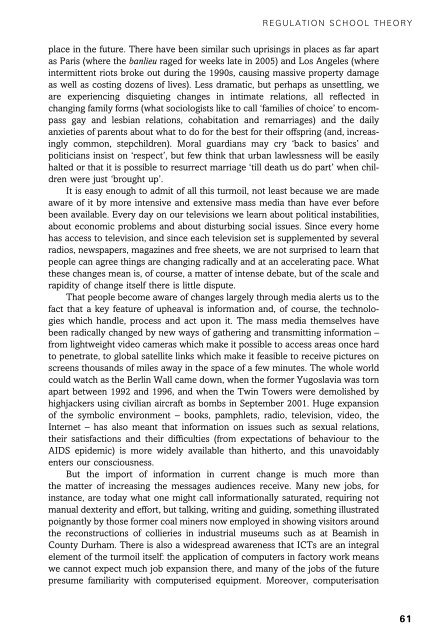Theories of the Information Society, Third Edition - Cryptome
Theories of the Information Society, Third Edition - Cryptome
Theories of the Information Society, Third Edition - Cryptome
Create successful ePaper yourself
Turn your PDF publications into a flip-book with our unique Google optimized e-Paper software.
REGULATION SCHOOL THEORY<br />
1<br />
1<br />
1<br />
2<br />
1<br />
1<br />
place in <strong>the</strong> future. There have been similar such uprisings in places as far apart<br />
as Paris (where <strong>the</strong> banlieu raged for weeks late in 2005) and Los Angeles (where<br />
intermittent riots broke out during <strong>the</strong> 1990s, causing massive property damage<br />
as well as costing dozens <strong>of</strong> lives). Less dramatic, but perhaps as unsettling, we<br />
are experiencing disquieting changes in intimate relations, all reflected in<br />
changing family forms (what sociologists like to call ‘families <strong>of</strong> choice’ to encompass<br />
gay and lesbian relations, cohabitation and remarriages) and <strong>the</strong> daily<br />
anxieties <strong>of</strong> parents about what to do for <strong>the</strong> best for <strong>the</strong>ir <strong>of</strong>fspring (and, increasingly<br />
common, stepchildren). Moral guardians may cry ‘back to basics’ and<br />
politicians insist on ‘respect’, but few think that urban lawlessness will be easily<br />
halted or that it is possible to resurrect marriage ‘till death us do part’ when children<br />
were just ‘brought up’.<br />
It is easy enough to admit <strong>of</strong> all this turmoil, not least because we are made<br />
aware <strong>of</strong> it by more intensive and extensive mass media than have ever before<br />
been available. Every day on our televisions we learn about political instabilities,<br />
about economic problems and about disturbing social issues. Since every home<br />
has access to television, and since each television set is supplemented by several<br />
radios, newspapers, magazines and free sheets, we are not surprised to learn that<br />
people can agree things are changing radically and at an accelerating pace. What<br />
<strong>the</strong>se changes mean is, <strong>of</strong> course, a matter <strong>of</strong> intense debate, but <strong>of</strong> <strong>the</strong> scale and<br />
rapidity <strong>of</strong> change itself <strong>the</strong>re is little dispute.<br />
That people become aware <strong>of</strong> changes largely through media alerts us to <strong>the</strong><br />
fact that a key feature <strong>of</strong> upheaval is information and, <strong>of</strong> course, <strong>the</strong> technologies<br />
which handle, process and act upon it. The mass media <strong>the</strong>mselves have<br />
been radically changed by new ways <strong>of</strong> ga<strong>the</strong>ring and transmitting information –<br />
from lightweight video cameras which make it possible to access areas once hard<br />
to penetrate, to global satellite links which make it feasible to receive pictures on<br />
screens thousands <strong>of</strong> miles away in <strong>the</strong> space <strong>of</strong> a few minutes. The whole world<br />
could watch as <strong>the</strong> Berlin Wall came down, when <strong>the</strong> former Yugoslavia was torn<br />
apart between 1992 and 1996, and when <strong>the</strong> Twin Towers were demolished by<br />
highjackers using civilian aircraft as bombs in September 2001. Huge expansion<br />
<strong>of</strong> <strong>the</strong> symbolic environment – books, pamphlets, radio, television, video, <strong>the</strong><br />
Internet – has also meant that information on issues such as sexual relations,<br />
<strong>the</strong>ir satisfactions and <strong>the</strong>ir difficulties (from expectations <strong>of</strong> behaviour to <strong>the</strong><br />
AIDS epidemic) is more widely available than hi<strong>the</strong>rto, and this unavoidably<br />
enters our consciousness.<br />
But <strong>the</strong> import <strong>of</strong> information in current change is much more than<br />
<strong>the</strong> matter <strong>of</strong> increasing <strong>the</strong> messages audiences receive. Many new jobs, for<br />
instance, are today what one might call informationally saturated, requiring not<br />
manual dexterity and effort, but talking, writing and guiding, something illustrated<br />
poignantly by those former coal miners now employed in showing visitors around<br />
<strong>the</strong> reconstructions <strong>of</strong> collieries in industrial museums such as at Beamish in<br />
County Durham. There is also a widespread awareness that ICTs are an integral<br />
element <strong>of</strong> <strong>the</strong> turmoil itself: <strong>the</strong> application <strong>of</strong> computers in factory work means<br />
we cannot expect much job expansion <strong>the</strong>re, and many <strong>of</strong> <strong>the</strong> jobs <strong>of</strong> <strong>the</strong> future<br />
presume familiarity with computerised equipment. Moreover, computerisation<br />
61
















